Stay in the loop on the latest research, events, and who’s crushing it in the lab: signing up for our STEEP Pathways Newsletter is easier than pronouncing per- and polyfluoroalkyl substances.
Subscribe
STEEP Newsletter 2025 Issue 1
Voices from STEEP
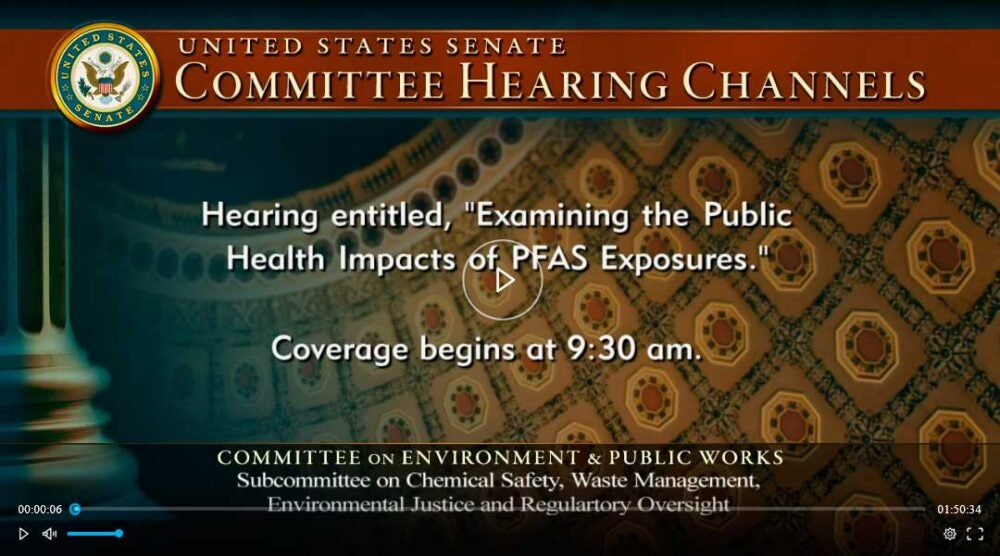 “We’re putting Teflon in our mouth.”
“We’re putting Teflon in our mouth.”
Laurel Schaider, PhD, STEEP Community Engagement Core co-lead and Project 4 lead, discussing dental floss as an example of PFAS in everyday products.
On December 5, 2024, Schaider gave expert testimony to the Subcommittee on Chemical Safety, Waste Management, Environmental Justice, and Regulatory Oversight of the U.S. Senate Committee on Environment and Public Works at the hearing, Examining the Public Health Impacts of PFAS Exposures. Schaider was joined by other witnesses Sue Fenton, PhD, Director of the Center for Human Health and the Environment, Professor of Biological Sciences, North Carolina State University; and Michael D. Larrañaga, PhD, PE, President and Managing Principal, R.E.M. Risk Consultants.
 Research Feature
Research Feature
Developed Models Expand Understanding of PFAS Bioaccumulation
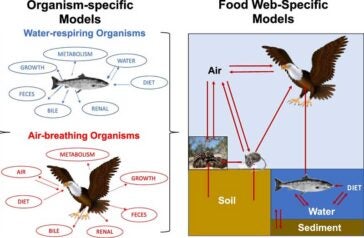 Co-authored by STEEP trainee Jennifer Sun, this publication was featured as the NIEHS Superfund Research Program (SRP) Research Brief for January 2025.
Co-authored by STEEP trainee Jennifer Sun, this publication was featured as the NIEHS Superfund Research Program (SRP) Research Brief for January 2025.
 Community Engagement
Community Engagement
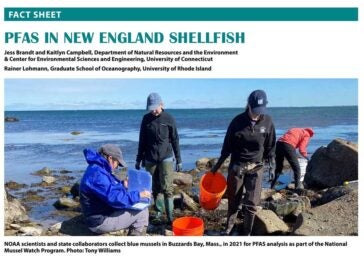 Lohmann Contributes to PFAS Fact Sheet for CT Sea Grant
Lohmann Contributes to PFAS Fact Sheet for CT Sea Grant
STEEP Director Rainer Lohmann, PhD recently contributed to a fact sheet, PFAS in New England Shellfish, for Connecticut Sea Grant at the University of Connecticut.
 Research Highlights
Research Highlights
STEEP Director Lohmann Co-Authors Award-Winning Paper
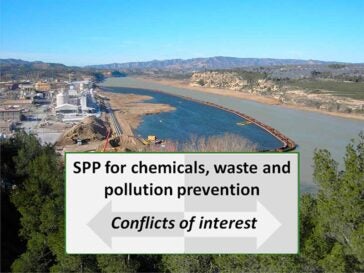 “Conflicts of Interest in the Assessment of Chemicals, Waste, and Pollution” was recently selected as the second joint runner-up in the category Feature, Viewpoint, or Perspective in the 2023 Environmental Science & Technology Best Paper Awards.
“Conflicts of Interest in the Assessment of Chemicals, Waste, and Pollution” was recently selected as the second joint runner-up in the category Feature, Viewpoint, or Perspective in the 2023 Environmental Science & Technology Best Paper Awards.
Wastewater Discharge Impacts Drinking Water for ~23M Americans
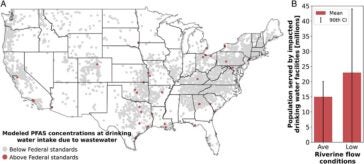 Research from former STEEP trainee Bridger Ruyle, PhD, and STEEP collaborators, finds large amounts of organofluorine in discharged wastewater, a critical concern for the quality of downstream drinking water.
Research from former STEEP trainee Bridger Ruyle, PhD, and STEEP collaborators, finds large amounts of organofluorine in discharged wastewater, a critical concern for the quality of downstream drinking water.
Research Finds Fish Contamination Far from PFAS Source
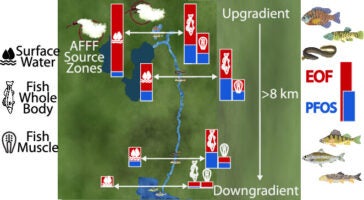 STEEP scientists discover PFAS in fish nearly 5 miles downstream.
STEEP scientists discover PFAS in fish nearly 5 miles downstream.
Kidney Transport and Elimination Across 14 PFAS
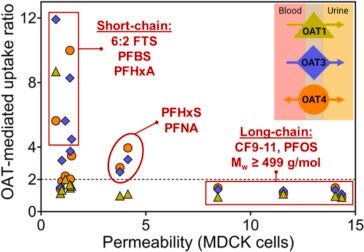 STEEP Project 3 examines permeability and other properties to predict PFAS movement to and from the kidneys.
STEEP Project 3 examines permeability and other properties to predict PFAS movement to and from the kidneys.
PFAS and the Pandemic: Connecting COVID-19 Deaths with PFAS in Drinking Water
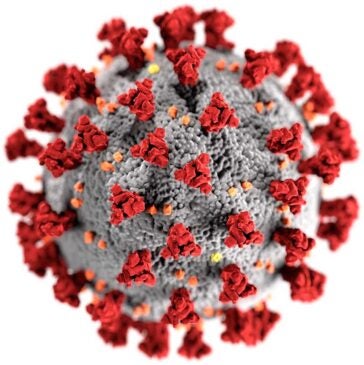 Lohmann joined scientists and regulators from 18 countries to discuss progress made from 2017-2022, highlighting the need to expand collaboration, communication, and diversity within the field.
Lohmann joined scientists and regulators from 18 countries to discuss progress made from 2017-2022, highlighting the need to expand collaboration, communication, and diversity within the field.
Research Links PFOS and Coronary Heart Disease
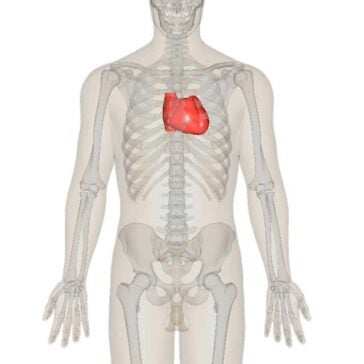 In a study examining 101 participants for seven PFAS, PFOS is found to have a significant association with the disease.
In a study examining 101 participants for seven PFAS, PFOS is found to have a significant association with the disease.
STEEP Research Collaboration: A Review of PFAS in the Arctic
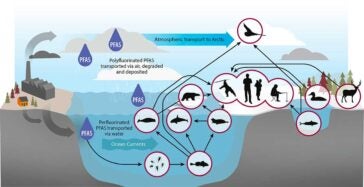 Existing studies show clear PFAS contamination of remote waters and animals; a panel of international scientists call for stricter regulations and community engagement to combat a crisis.
Existing studies show clear PFAS contamination of remote waters and animals; a panel of international scientists call for stricter regulations and community engagement to combat a crisis.
Drinking Water Ferries Unregulated Contaminants to More than 97 Million US Residents
 STEEP collaborates on research looking at relationships between unregulated contaminants and socioeconomic disparities.
STEEP collaborates on research looking at relationships between unregulated contaminants and socioeconomic disparities.
What Can Whale Baleen Tell Us About PFAS in the Ocean?
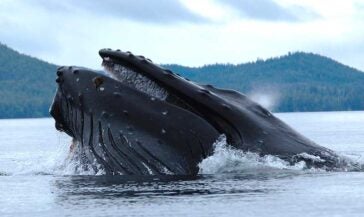 A study co-authored by STEEP researchers found baleen may be able to detail PFAS exposure over time, and provide information about a whale’s life history.
A study co-authored by STEEP researchers found baleen may be able to detail PFAS exposure over time, and provide information about a whale’s life history.
 Other Related Publications
Other Related Publications
STEEP Director Lohmann Leads International Effort on Pollutant Passive Sampling
 When not researching PFAS, Lohmann collaborates with AQUA-GAPS/MONET, an international passive sampling effort assessing persistent organic pollutants in global waters.
When not researching PFAS, Lohmann collaborates with AQUA-GAPS/MONET, an international passive sampling effort assessing persistent organic pollutants in global waters.
 Program Updates
Program Updates
STEEP Beyond the Lab
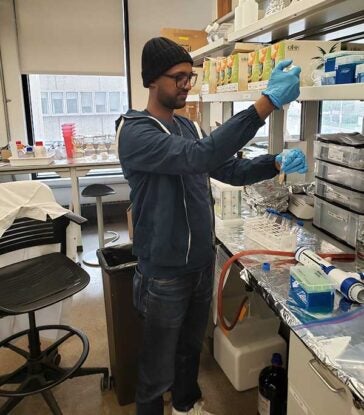
In December, trainee Asta Habtemichael prepared plankton tissue samples for PFAS extraction as part of his work with STEEP Project 4.
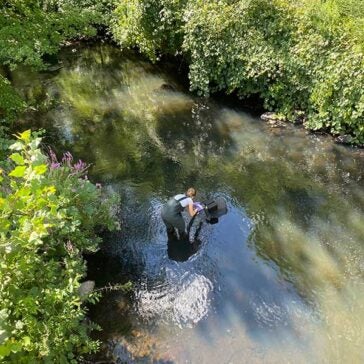 Taylor Elpers, trainee in STEEP Project 4, deploys DGTs (passive samplers) developed by fellow trainee Jarod Snook. Elpers is collecting data from the Woonasquatucket River, an urban river in Providence, Rhode Island, to understand PFAS concentrations in the water.
Taylor Elpers, trainee in STEEP Project 4, deploys DGTs (passive samplers) developed by fellow trainee Jarod Snook. Elpers is collecting data from the Woonasquatucket River, an urban river in Providence, Rhode Island, to understand PFAS concentrations in the water.
 STEEP Trainee Accomplishments
STEEP Trainee Accomplishments
Congratulations, Jahred Liddie, PhD!
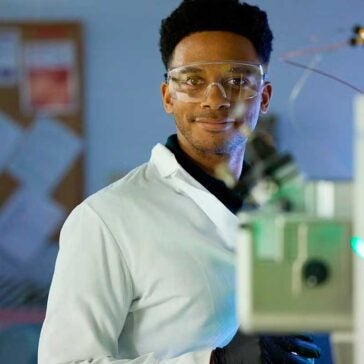 Congratulations to STEEP trainee Jahred Liddie, Harvard University, for successfully defending his Ph.D. dissertation, Trends and Disparities in Contamination by PFAS in United States Community Water Systems.
Congratulations to STEEP trainee Jahred Liddie, Harvard University, for successfully defending his Ph.D. dissertation, Trends and Disparities in Contamination by PFAS in United States Community Water Systems.
SERDP ESTCP Highlights Snook
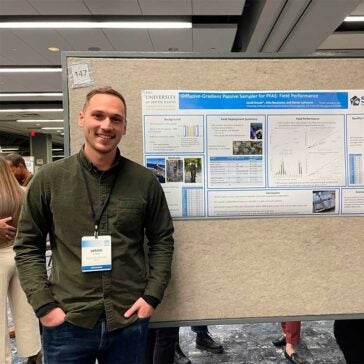 On LinkedIn, STEEP trainee and PhD candidate Jarod Snook was highlighted for his poster at the 2024 DoD Energy and Environment Innovation Symposium. Snook, working within STEEP Project 4 at the University of Rhode Island, presented his Strategic Environmental Research and Development Program (SERDP) project focusing on the evaluation and validation of passive samplers capable of quantitatively pre-concentrating a wide range of PFAS from surface water, groundwater, and porewater. Learn more on the SERDP & ESTCP website.
On LinkedIn, STEEP trainee and PhD candidate Jarod Snook was highlighted for his poster at the 2024 DoD Energy and Environment Innovation Symposium. Snook, working within STEEP Project 4 at the University of Rhode Island, presented his Strategic Environmental Research and Development Program (SERDP) project focusing on the evaluation and validation of passive samplers capable of quantitatively pre-concentrating a wide range of PFAS from surface water, groundwater, and porewater. Learn more on the SERDP & ESTCP website.
 Op-Ed Features
Op-Ed Features
FLUOROS Global: A Story of Subtle Evolution from Scientific Conference to Discourse Community
Written by Asta Zerue Habtemichael, STEEP trainee and PhD candidate, University of Rhode Island Graduate School of Oceanography
Scientific conferences are a critical forum to network, communicate research and new findings, and engage in debate toward the advancement of science. We examine FLUOROS Global as a discourse forum, exploring its evolution from a chemical science platform to a distinctly transdisciplinary approach to research.
The Merits of an Externship
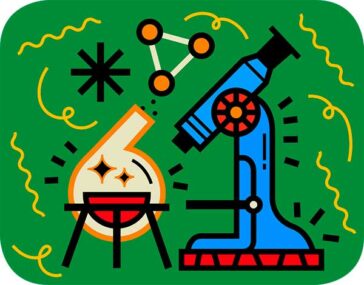 Written by Justin Sankey, STEEP trainee and PhD candidate, University of Rhode Island Graduate School of Oceanography
Written by Justin Sankey, STEEP trainee and PhD candidate, University of Rhode Island Graduate School of Oceanography
If you are a graduate student, like me, you may find yourself wondering about externships: what they are, how to find labs to work with, how they will benefit your research/career development, etc. Having the benefit of belonging to a NIEHS Superfund Research Program (SRP), I had the unprecedented opportunity to talk to senior Ph.D. candidates about experiences with externships, from where they worked to the skills and experiences gained through them.
 Soundbites from STEEP
Soundbites from STEEP
“Ultimately, we need to do a better job at protecting source waters and reducing discharges of pollutants into water bodies that feed into our drinking water supplies.” – Laurel Schaider, PhD, Project 4 and Community Engagement Core Co-Lead, in response to press coverage of a recent STEEP research collaboration. This research was widely publicized, featured in Newsweek, New York Post, and Phys.org.
“You can look for flosses that say PTFE, that’s the chemical name for Teflon, as another clue.” – Schaider was also recently featured on Houston’s Fox 26 to talk about PFAS in dental floss.
“We have a better understanding of the vast scope of the problem.” – STEEP Director Rainer Lohmann, PhD, in the recent feature article, POINT OF ORIGIN: Researchers are profiling the sources and movement of ‘forever chemical’ contamination, from the University of Rhode Island Graduate School of Oceanography.
“[It’s] chemical whack-a-mole.”—Elsie Sunderland, PhD, STEEP Project 1 Lead, describing the rapid development and yet unknown health impacts of new PFAS compounds, as quoted in an article for France 24.
Tap into STEEP
web.uri.edu/steep: Your one-stop shop for all things STEEP—research updates, resources, and more. Because who doesn’t love a good scroll?
Or follow us on socials:
🐦 X: @steepsuperfund
📘 Facebook: @steepsuperfund
📷 Instagram: @steepsuperfund
🔗 LinkedIn: URI Superfund Research Program
Read the 2024 Issue 2 Newsletter
Read the 2024 Issue 1 Newsletter
Read the Spring/Summer 2023 Newsletter
Read the Winter 2023 Newsletter
Read the Winter 2022 Newsletter
Read the Spring 2021 Newsletter


